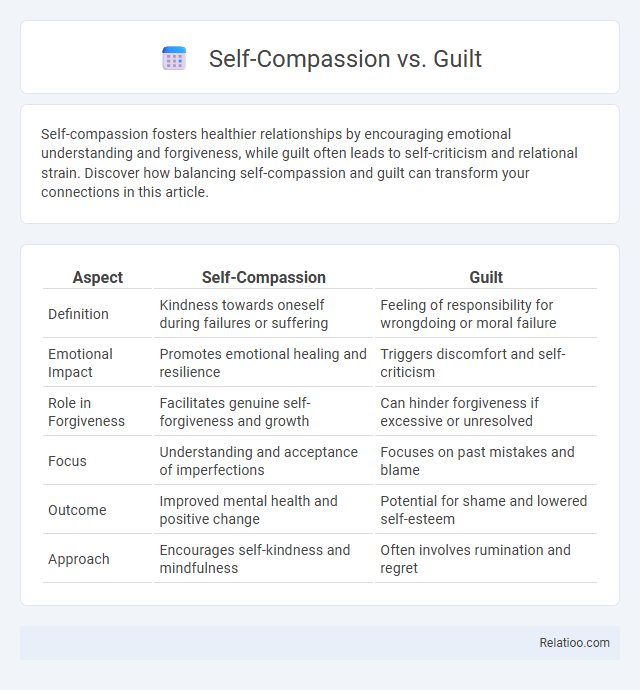Self-compassion fosters healthier relationships by encouraging emotional understanding and forgiveness, while guilt often leads to self-criticism and relational strain. Discover how balancing self-compassion and guilt can transform your connections in this article.
Table of Comparison
| Aspect | Self-Compassion | Guilt |
|---|---|---|
| Definition | Kindness towards oneself during failures or suffering | Feeling of responsibility for wrongdoing or moral failure |
| Emotional Impact | Promotes emotional healing and resilience | Triggers discomfort and self-criticism |
| Role in Forgiveness | Facilitates genuine self-forgiveness and growth | Can hinder forgiveness if excessive or unresolved |
| Focus | Understanding and acceptance of imperfections | Focuses on past mistakes and blame |
| Outcome | Improved mental health and positive change | Potential for shame and lowered self-esteem |
| Approach | Encourages self-kindness and mindfulness | Often involves rumination and regret |
Understanding Self-Compassion: Definition and Importance
Self-compassion involves treating Yourself with kindness, recognizing your shared humanity, and maintaining mindful awareness of your emotions. Unlike guilt, which often triggers self-criticism and negative feelings, self-compassion fosters emotional resilience and mental well-being. Understanding this concept is crucial for enhancing your self-esteem and improving your ability to cope with life's challenges.
The Nature of Guilt: Origins and Psychological Impact
Guilt originates from the internalization of societal and personal moral standards, often signaling a perceived failure to meet those expectations. Your experience of guilt can lead to negative emotional states such as shame and anxiety, impacting mental health by fostering self-criticism rather than growth. Understanding the psychological impact of guilt is crucial for developing self-compassion, which promotes healing through kindness and acceptance rather than punishment.
Self-Compassion vs. Guilt: Key Differences
Self-compassion involves treating yourself with kindness and understanding during setbacks, while guilt focuses on feeling responsible for specific wrongdoings. You can cultivate self-compassion by recognizing that imperfections are part of the human experience, promoting emotional resilience and reducing negative self-judgment. Unlike guilt, which often leads to rumination and decreased motivation, self-compassion encourages growth through forgiveness and acceptance.
How Self-Compassion Transforms Self-Criticism
Self-compassion transforms self-criticism by replacing harsh judgment with understanding and kindness, fostering emotional resilience and psychological wellbeing. Unlike guilt, which emphasizes fault and punishment, self-compassion encourages constructive reflection without self-condemnation, promoting healthier coping mechanisms. Research shows that cultivating self-compassion reduces anxiety and depression, enabling individuals to respond to personal failures with support rather than self-reproach.
The Effects of Guilt on Mental Health
Guilt can negatively impact your mental health by increasing feelings of anxiety, depression, and stress. Unlike self-compassion, which promotes emotional resilience and healing, guilt often triggers self-criticism and ruminative thinking. Practicing self-compassion helps you break the cycle of guilt, fostering emotional well-being and healthier coping mechanisms.
Cultivating Self-Compassion: Practical Techniques
Cultivating self-compassion involves techniques such as mindfulness meditation, which helps individuals observe their feelings without judgment, and self-kindness exercises that replace critical inner dialogue with supportive affirmations. Practices like journaling about personal strengths and challenges foster emotional resilience, enabling one to respond to guilt with understanding rather than harsh self-criticism. Leveraging these methods enhances psychological well-being by promoting a balanced self-view and reducing the negative impact of guilt on mental health.
Overcoming Unhealthy Guilt Patterns
Understanding the distinction between self-compassion and unhealthy guilt is crucial for overcoming destructive emotional patterns that hinder personal growth. When you practice self-compassion, you acknowledge your mistakes without harsh self-judgment, fostering emotional resilience and mental well-being. Cultivating self-compassion helps break the cycle of persistent guilt by promoting forgiveness and a balanced perspective on your actions.
Self-Compassion in Everyday Life: Real-World Examples
Self-compassion involves treating yourself with kindness and understanding during times of failure or suffering, unlike guilt which often leads to self-criticism and shame. In everyday life, practicing self-compassion can help you cope with mistakes by encouraging positive self-talk, such as reminding yourself that everyone experiences setbacks. Real-world examples include forgiving yourself after a missed deadline or approaching personal challenges with patience, ultimately promoting emotional resilience and well-being.
Balancing Accountability with Kindness
Balancing accountability with kindness involves acknowledging mistakes through self-compassion rather than succumbing to guilt, which often leads to harsh self-criticism and decreased motivation. Research indicates that practicing self-compassion enhances emotional resilience, allowing individuals to learn from errors while maintaining a supportive inner dialogue. This approach fosters personal growth by promoting responsibility without the detrimental effects of shame or self-blame.
Building Emotional Resilience: Choosing Self-Compassion Over Guilt
Building emotional resilience involves adopting self-compassion rather than succumbing to guilt, as self-compassion promotes mental well-being by fostering kindness and understanding toward oneself during difficulties. Guilt often leads to negative self-judgment and emotional distress, undermining confidence and increasing vulnerability to stress. Emphasizing self-compassion enhances adaptive coping strategies, reduces anxiety, and supports long-term psychological strength.

Infographic: Self-compassion vs Guilt
 relatioo.com
relatioo.com